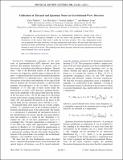Unification of Thermal and Quantum Noises in Gravitational-Wave Detectors
Author(s)
Whittle, Chris; McCuller, Lee; Sudhir, Vivishek; Evans, Matthew
DownloadPhysRevLett.130.241401.pdf (403.1Kb)
Publisher Policy
Publisher Policy
Article is made available in accordance with the publisher's policy and may be subject to US copyright law. Please refer to the publisher's site for terms of use.
Terms of use
Metadata
Show full item recordAbstract
Contemporary gravitational-wave detectors are fundamentally limited by thermal noise-due to dissipation in the mechanical elements of the test mass-and quantum noise-from the vacuum fluctuations of the optical field used to probe the test-mass position. Two other fundamental noises can in principle also limit sensitivity: test-mass quantization noise due to the zero-point fluctuation of its mechanical modes and thermal excitation of the optical field. We use the quantum fluctuation-dissipation theorem to unify all four noises. This unified picture shows precisely when test-mass quantization noise and optical thermal noise can be ignored.
Date issued
2023-06-12Department
LIGO (Observatory : Massachusetts Institute of Technology); Massachusetts Institute of Technology. Department of Mechanical EngineeringJournal
Physical Review Letters
Publisher
American Physical Society
Citation
Whittle, Chris, McCuller, Lee, Sudhir, Vivishek and Evans, Matthew. 2023. "Unification of Thermal and Quantum Noises in Gravitational-Wave Detectors." Physical Review Letters, 130 (24).
Version: Final published version
ISSN
0031-9007
1079-7114